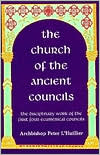List Books » The Church of the Ancient Councils: The Disciplinary Work of the First Four Ecumenical Councils
Category Books
- Fiction Books & Literature
- Graphic Novels
- Horror
- Mystery & Crime
- Poetry
- Romance Books
- Science Fiction & Fantasy
- Thrillers
- Westerns
- Ages 0-2
- Ages 3-5
- Ages 6-8
- Ages 9-12
- Teens
- Children's Books
- African Americans
- Antiques & Collectibles
- Art, Architecture & Photography
- Bibles & Bible Studies
- Biography
- Business Books
- Christianity
- Computer Books & Technology Books
- Cookbooks, Food & Wine
- Crafts & Hobbies Books
- Education & Teaching
- Engineering
- Entertainment
- Foreign Languages
- Game Books
- Gay & Lesbian
- Health Books, Diet & Fitness Books
- History
- Home & Garden
- Humor Books
- Judaism & Judaica
- Law
- Medical Books
- New Age & Spirituality
- Nonfiction
- Parenting & Family
- Pets
- Philosophy
- Political Books & Current Events Books
- Psychology & Psychotherapy
- Reference
- Religion Books
- Science & Nature
- Self Improvement
- Sex & Relationships
- Social Sciences
- Sports & Adventure
- Study Guides & Test Prep
- Travel
- True Crime
- Weddings
- Women's Studies
The Church of the Ancient Councils: The Disciplinary Work of the First Four Ecumenical Councils »

Authors: Peter L'Huillier
ISBN-13: 9780881410075, ISBN-10: 0881410071
Format: Paperback
Publisher: St. Vladimir's Seminary Press
Date Published: March 1997
Edition: (Non-applicable)
Author Biography: Peter L'Huillier
Book Synopsis
"Just as the four books of the holy gospel, so also I confess to receive and venerate four councils." With these words Pope St Gregory the Great of Rome (Ep. I.24) expressed his respect for the authority of the four most ancient ecumenical councils: Nicea (325 AD), Constantinople (381), Ephesus (431) and Chalcedon (451). These councils not only defined trinitarian and christological dogma in terms which ever since have been regarded as normative by the major Christian confessions of East and West. They also laid down canons and disciplinary decrees which constitute a milestone in the history of church order, signaling as they do a shift from the multifarious customary law of earlier centuries to a written law universally applicable throughout the Church. Given the great importance of these canons of the ancient ecumenical councils, what precisely do they say and mean? What was the intention of their authors, the fathers of those councils? With the present work, His Eminence Archbishop Peter (L'Huillier) has given the English-speaking world authoritative answers to such questions. After providing an historical overview of each of the four councils, he meticulously examines their canons one by one. He translates them into clear and readable English on the basis of the best modern critical editions; he explains the sometimes ambiguous terminology of the original texts; he explores the historical circumstances which gave rise to these canons in the first place; and he also indicates some of the ways in which they have been reinterpreted (and sometimes misinterpreted) in later centuries. The author does not claim to give answers to all the questions which we today might wish that the ancient canons addressed. Rather, as a scholar, he seeks to engage others in the challenges which honest scholarship poses, to lead them into the world of the ancient councils in order to discover the mens legislatoris. And at the same time, as a bishop, he seeks to discern the continui
Table of Contents
Subjects
 General & Miscellaneous Law
General & Miscellaneous Law  Legal History
Legal HistoryLaw
 Religious Law
Religious Law  Canon Law
Canon LawNonfiction
 Law
Law  General & Miscellaneous Law
General & Miscellaneous LawNonfiction
 Law
Law  Religious Law
Religious LawChristianity
 Christianity
Christianity  All Religion
All ReligionNonfiction
 Religion
Religion  All Religion
All ReligionPolitical Books & Current Events Books
 Law
Law  General & Miscellaneous Law
General & Miscellaneous LawPolitical Books & Current Events Books
 Law
Law  Religious Law
Religious LawReligion Books
 Christianity
Christianity  All Religion
All Religion
